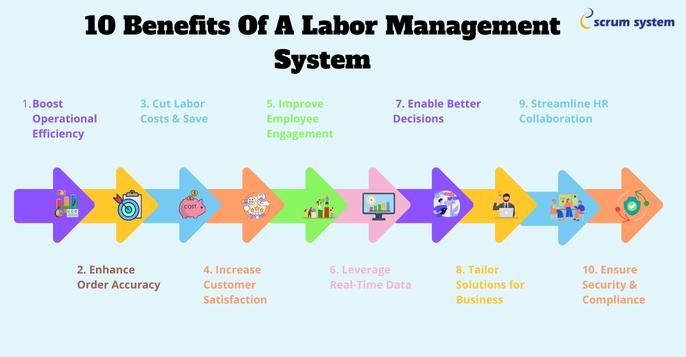Introduction:
In the fast-paced business world, better labor management has never been more important than it is at present. With the shift from traditional to more complex and hybrid models, the demand for a robust Labor Management System (LMS) has risen to the thousands. Not only does an LMS automate but also ensures improvements in the productivity levels and job satisfaction of employees and management alike. Let us now see what the ten proven benefits are that make an LMS irresistible for the modern business house.
- Boost Operational Efficiency
- Enhance Order Accuracy
- Cut Labor Costs & Save
- Increase Customer Satisfaction
- Improve Employee Engagement
- Leverage Real-Time Data
- Enable Better Decisions
- Tailor Solutions for Business
- Streamline HR Collaboration
- Ensure Security & Compliance
1. Better Operational Efficiency
The highest benefit of an LMS is the incredible efficiency in operations that it provides. The managers are provided with one comprehensive toolset for:
- Planning
- Monitoring
- Analyzing workforce activities
It can identify sources of inefficiency and resolve them quickly to deliver smooth operations and optimum resource allocation. As the LMS naturally works with the workflows already in place, it promotes lean methodologies and helps reduce waste, ultimately enhancing service quality.
2. Improved Accuracy of Fulfillment
In logistics and warehousing, the order-filling accuracy is very important. An LMS increases this accuracy by bringing all organizational activities—from picking to shipping—under its structured framework. This minimizes the risks of error and ensures customers receive exactly what they ordered, thus increasing reliability and trust in your business.
3. Reduced Labor Costs and Increased Savings
Labor costs can burn a big hole in a firm’s bottom line if not managed properly. An LMS directly addresses this through:
- Workforce deployment optimization
- Reducing unnecessary overtime
By using real-time tracking and analytics, businesses can align their labor force with operational needs, significantly reducing labor expenses.
4. Increased Customer Satisfaction
With improved accuracy in fulfillment, customer satisfaction will soar. Customers will receive products faster with fewer errors as processes are streamlined. This predictability builds loyalty, ensuring long-term customer retention and enhancing your brand reputation.
5. Employee Engagement and Retention Enhancement
A good LMS fosters a positive work culture by setting forth performance standards and clear expectations. This alignment with organizational goals leads to intensive engagement. Additionally, high-performance employee recognition and reward features contribute to morale and job satisfaction, which are key to retaining top talent.
6. Real-Time Data for Effective Decision Making
The use of real-time data is undoubtedly powerful. With an LMS, management will have instant access to critical metrics and analytics that enable swift and informed decision-making. This data is invaluable for adapting to market changes, planning for future needs, and refining strategies to stay competitive.
7. Better Management Decisions
LMS facilities enable strategic decision-making by managers, allowing better management practices. Real-time data and analytics help allocate resources efficiently and make adjustments before minor issues escalate into costly problems.
8. Tailor-made Solutions to Unique Business Needs
Every business is unique, and a flexible LMS can be tailored to meet those specific needs. Whether it’s customized reporting, special performance metrics, or integration with other software, an LMS can be set up to complement existing processes and achieve company-specific objectives.
9. More Options for HR Collaboration
For teams spread across different geographies or time zones, a cloud-based LMS offers a platform where all HR functions are accessible with a single click. This easy collaboration ensures the HR staff remains aligned and can save time by integrating data from various sources.
10. Enhanced Security and Compliance
Handling sensitive employee data requires robust security measures, and a good LMS ensures secure storage and management of both personal and operational data. Access control and compliance with appropriate laws and regulations protect the company from data breaches and build confidence among employees and stakeholders.
Choosing the Appropriate LMS
When selecting the right LMS for your business, consider the following factors:
- Compatibility with existing systems
- Scalability
- Customization options
- Support from the provider
Additionally, reviewing testimonials and case studies can give you deeper insights into how the LMS may perform in your specific environment.
Conclusion
The Labor Management Systems can have a tremendous, ongoing impact on business operations. With full automation, real-time analytics, and custom solutions, an LMS can create a foundation for sustainable growth and success. If you want to optimize operational efficiency and employee satisfaction, implementing an LMS could be the strategic move your business needs.



